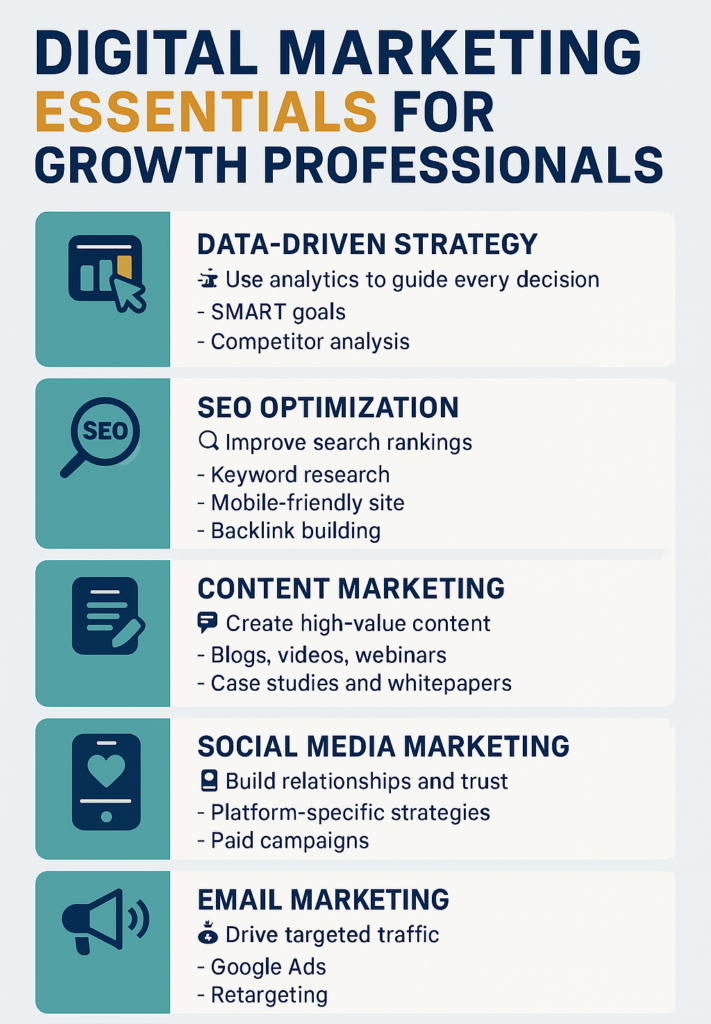8 Expert Digital Marketing Strategies to Drive Business Growth
In an era where digital presence can make or break a business, mastering digital marketing is no longer optional – it’s essential. With evolving consumer behavior, emerging platforms, and ever-changing algorithms continously, professionals need to go beyond basic tactics and adopt smart, scalable strategies to stay ahead of the curve.
Digital marketing success isn’t just about flashy campaigns or viral moments. It’s about consistent, data-driven efforts that align with business objectives and customer needs. In this article, we’ll dive into professional digital marketing strategies that can significantly improve reach, engagement, conversions, and long-term growth.
1. Build a Strong, Data-Driven Marketing Foundation
Success in digital marketing begins with strategy – and that strategy must be built on data. Professional marketers leverage data not just to measure performance, but to predict behavior, personalize content, and improve ROI.
Key practices include:
- Define clear KPIs aligned with your business goals.
- Use tools like Google Analytics, HubSpot, or SEMrush for tracking traffic sources, user journeys, and conversion paths.
- Conduct customer segmentation to target campaigns based on demographics, behaviors, and purchase intent.
- Continuously refine strategies based on performance data and user feedback.
Remember: what gets measured gets improved.

2. Develop a High-Performance Content Strategy
Content is still the fuel for all digital channels – SEO, social media, email, and even paid ads rely on quality content. But professional marketers don’t just publish – they strategize.
Pro tips for content success:
- Create content tailored to each stage of the customer journey (awareness, consideration, decision).
- Use storytelling to make your brand relatable and human.
- Repurpose long-form content into bite-sized pieces for different platforms (e.g., blog → LinkedIn post → infographic).
- Focus on E-E-A-T (Experience, Expertise, Authority, and Trust) to rank well in Google.
A great content strategy doesn’t just attract traffic – it builds authority and nurtures trust.
3. Master SEO With a Long-Term Perspective – SEO for Business Growth
Search engine optimization (SEO) remains a cornerstone of digital visibility. Professional success in SEO comes from a long-term, consistent investment – not just quick fixes.
Professional SEO strategy should include:
- Keyword research focused on intent, not just volume.
- On-page optimization: meta titles, descriptions, header tags, image alt text, and internal linking.
- Technical SEO: site speed, mobile optimization, and structured data.
- Off-page SEO: link-building, guest blogging, and PR efforts.
SEO is about staying relevant, visible, and credible. Think about is as a marathon, not a short distance to go along.
4. Embrace the Power of Marketing Automation for Digital Marketing Strategies
Time is a marketer’s most limited resource. Marketing automation helps streamline efforts, increase personalization, and scale results.
Top uses of automation include:
- Email marketing workflows for lead nurturing and onboarding.
- Dynamic content delivery based on user behavior.
- Automated social media posting and engagement tracking.
- CRM integration to align sales and marketing efforts.
Platforms like HubSpot, ActiveCampaign, and Mailchimp make automation accessible, very user friendly and powerful.
5. Invest in Paid Advertising – Strategically
While organic strategies build long-term value, paid advertising provides a quick boost and precision targeting. Professionals should use paid media not just for traffic, but mainly for conversions.
Tips for effective paid campaigns:
- Use highly targeted audiences based on location, behavior, job title, etc.
- Create dedicated landing pages with strong calls-to-action (CTAs).
- Use A/B testing to optimize ad copy, design, and placement.
- Retarget users who abandoned cart or visited key pages.
Whether on Google Ads, LinkedIn, or Meta platforms, paid ads are best when integrated into a broader strategy. Remember – they change and keep yourself updated.
6. Create a Seamless Omnichannel Experience
Customers today interact with brands across multiple platforms – sometimes within the same day. A professional digital marketing strategy ensures consistency and relevance at every touchpoint.
Key elements of an omnichannel approach:
- Unified branding and messaging across all channels.
- Consistent CTAs from social to web to email.
- Cross-platform retargeting campaigns.
- Use of unified analytics to track full customer journeys.
Omnichannel marketing helps brands stay present and relevant – and makes it easier for customers to convert when they’re ready.
7. Leverage Social Proof and User-Generated Content
Trust is a crucial factor in digital success. Professional marketers build trust using social proof — customer reviews, testimonials, influencer collaborations, and user-generated content (UGC).
How to implement:
- Encourage reviews on platforms like Google, Trustpilot, and industry directories.
- Showcase testimonials on your website and landing pages.
- Collaborate with industry influencers and micro-influencers.
- Run UGC campaigns to feature real customers using your products/services.
People trust people — not ads. Social proof bridges the gap between awareness and action.
8. Continuously Test, Learn, and Adapt – Best Strategy for Professionals
Digital marketing success is dynamic. What worked six months ago might not work tomorrow. That’s why professionals embrace a mindset of continuous improvement.
Adopt these habits:
- Regularly run A/B tests on email campaigns, landing pages, and ad copy.
- Experiment with new platforms (e.g., TikTok, Threads, or Reddit) to reach new audiences.
- Attend webinars, follow thought leaders, and stay updated with algorithm changes.
- Learn from both failures and successes – then iterate.
Agility is key in an industry that never stops evolving.
Professional digital marketing success isn’t about chasing trends – it’s about building sustainable systems, delivering consistent value, and making data-driven decisions. From SEO and content marketing to automation and paid advertising, success requires a holistic, integrated approach tailored to your audience and goals.
Whether you’re a marketing professional, business owner, or consultant, mastering these strategies will position you to lead your brand – and your career – to long-term success in the digital age.
Think Long-Term. Market Smarter. Win Bigger.
